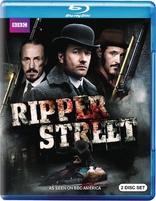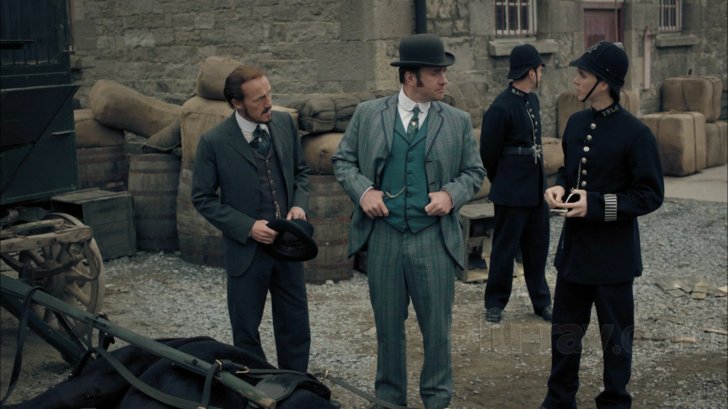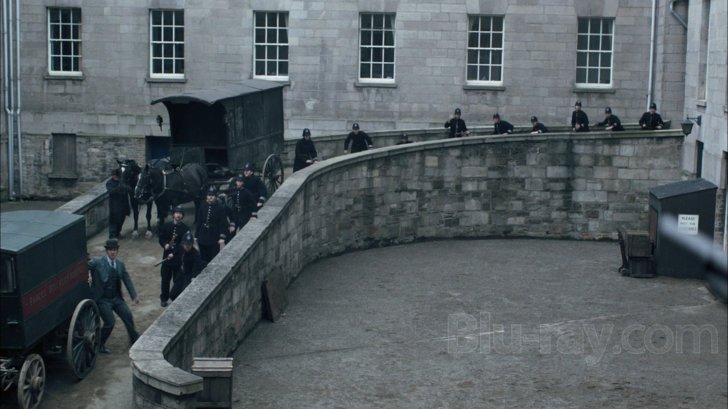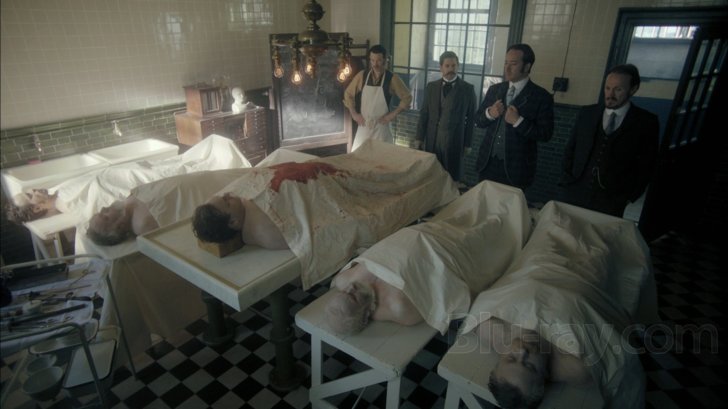Ripper Street: Season One Blu-ray Movie
HomeRipper Street: Season One Blu-ray Movie 
Blu-ray + UV Digital CopyBBC | 2012 | 450 min | Not rated | Mar 12, 2013

Movie rating
7.3 | / 10 |
Blu-ray rating
| Users | 0.0 | |
| Reviewer | 4.0 | |
| Overall | 4.0 |
Overview
Ripper Street: Season One (2012)
In 1889, H Division, the Whitechapel police precinct in the East End of London, struggles to allay fear and keep order in the aftermath of Jack the Ripper's unsolved murders.
Starring: Matthew Macfadyen, Adam Rothenberg, Jerome Flynn, MyAnna Buring, David Wilmot (I)Director: Andy Wilson (IV), Anthony Byrne, Tom Shankland, Kieron Hawkes, Luke Watson (I)
| Crime | Uncertain |
| Drama | Uncertain |
| Mystery | Uncertain |
Specifications
Video
Video codec: MPEG-4 AVC
Video resolution: 1080p
Aspect ratio: 1.78:1
Original aspect ratio: 1.78:1
Audio
English: DTS-HD Master Audio 2.0 (48kHz, 24-bit)
Subtitles
English SDH
Discs
50GB Blu-ray Disc
Two-disc set (2 BDs)
UV digital copy
Packaging
Slipcover in original pressing
Playback
Region A, B (C untested)
Review
Rating summary
| Movie | 4.5 | |
| Video | 4.5 | |
| Audio | 3.5 | |
| Extras | 1.0 | |
| Overall | 4.0 |
Ripper Street: Season One Blu-ray Movie Review
Jack's Not Back
Reviewed by Michael Reuben March 20, 2013What happens in the aftermath of Jack the Ripper? How do the authorities proceed when the world's first celebrity serial killer abruptly ceases his campaign of slaughter and vanishes, leaving a terrified populace without the closure of having the perpetrator identified and captured? That is the intriguing premise behind Ripper Street, an eight-hour series jointly produced by the BBC and BBC America and aired by both channels beginning on December 30, 2012 in England and January 19, 2013 in America. Audience response was so strong that a second series was ordered before the first had completed its run. In 1888, the killer who came to be known as "the Ripper" butchered five women, all of them prostitutes working the seedy and crime-ridden London district called Whitechapel. (Other victims initially attributed to the Ripper were later excluded.) The murders were notable for their extreme savagery, including grotesque mutilation of the bodies after death. Despite extensive press coverage, intensive police investigation and even eyewitness testimony, no suspect was ever confirmed. Theories and legends regarding the killer's identity continue to multiply. Ripper Street picks up in 1889, six months after what we now know to be the last of the Ripper's murders. But the officers of H Division, the station responsible for policing Whitechapel and protecting the district's still-terrified citizenry, didn't know what we know now. They began every day wondering whether the Ripper would reappear. Indeed, as events in the series often suggest, there were those in Whitechapel who secretly yearned for the monster's return. Some were members of the press, who had never before enjoyed such a perfect exemplar of the tabloid motto, "If it bleeds, it leads." Others were lawmen who had dedicated months of their lives to capturing the demon who had stalked the city's streets, only to have him vanish like a spirit, leaving them with no satisfaction for their efforts and no release for their obsession.

Ripper Street is one of those novel-like shows in which each episode tells a self-contained story but also advances a larger plot (or several) that winds through the series. Series creator Richard Warlow wrote most of the episodes, and because he did not know at the time whether there would be anything beyond these initial eight, he made sure to complete the essential dramatic arcs by the end. Anyone who watches the episodes contained on these two Blu-ray discs will not feel they've been left hanging. The central figure in Ripper Street is the current commander of H Division, Det. Inspector Edmund Reid (Matthew Macfadyen, who was Mr. Darcy in the most recent film version of Pride and Prejudice and also had a recurring role on MI-5). Reid worked under Chief Inspector Fred Abberline (Clive Russell), the real historical figure who headed the Ripper investigation. Much more than Abberline, Reid wants to move beyond the Ripper case to deal with other problems afflicting poverty-stricken Whitechapel—substantial problems that include an influx of immigrants from Eastern Europe, the rise of trade unions and labor disputes and the forcible ejection of local residents from their homes to make way for construction of the London Underground. In Reid's mind, too much has gone undone while H Division devoted all its resources to the pursuit of one man. "Moving on" is a topic of great personal import to Reid, whose marriage to Emily (Amanda Hale) is suffering the aftereffects of a personal tragedy. The details emerge only gradually, but the distance between husband and wife is immediately apparent. For a man whose daily routine brings him into contact with numerous women, many of them available and willing, and on whom the grim work of policing Whitechapel takes an emotional toll, the inability to find solace at home poses many dangers. Reid's approach to police work is a unique amalgam of traditional and modern. The traditional element is embodied in his fiercely loyal sergeant, Bennet Drake (Jerome Flynn, who plays Bronn on Game of Thrones). A former soldier, Drake says little, but when he speaks, it's in the accent of the locale where he works (unlike Reid, whose intonations and vocabulary indicate a more comfortable upbringing and better education). A hard man and a brawler whom we first meet masquerading as a boxer in an undercover sting of illegal gambling, Drake is the man on whom Reid depends when information must be beaten out of a suspect. But like so many "hard" men, Drake conceals a soft center, and his weakness proves to be a woman, inevitably the wrong one. The contemporary side of Reid's method is represented by an American, Capt. Homer Jackson (Adam Rothenberg), a former Army doctor and Pinkerton's detective—or possibly not. Capt. Jackson's background is obscure, and from the opening episode, there are indications that he is someone other than (or in addition to) what he claims. He resides in a brothel operated by a madam known as "Long Susan" (MyAnna Buring), with whom he has some sort of unspecified arrangement that lets him enjoy the favors of her girls. Jackson is, however, a skilled doctor with a gift for autopsies and an extensive knowledge of chemistry. These talents make him valuable to Reid, who recruits him as H Division's "surgeon" (the term "pathologist" did not yet exist). In exchange, Reid looks the other way when it comes to Long Susan. This unlikely trio can barely get along—Jackson and Drake clash repeatedly—but they function effectively in the face of major challenges. In the opening episode ("I Need Light"), a woman's body is found with various signatures of a Ripper murder. Reid quickly determines that many of these were faked by an ambitious newspaperman, Fred Best (David Dawson), looking for another gruesome headline. But that leaves the question of who did commit the crime. Identifying the culprit serves as a reminder to everyone, including Chief Inspector Abberline, that there are other monsters in London besides the Ripper. In Episode 2 ("Under My Protection"), a local toymaker is found murdered, and a vigilante group formed to hunt the Ripper brings Reid the alleged culprit, a boy named Thomas Gower (Giacomo Mancini). The vigilantes supply evidence, but Jackson's autopsy suggests additional culprits. By the end, Reid and his colleagues find themselves caught between the vigilantes and a secret criminal organization, neither of which has any regard for the police. Episode 3 ("The King Came Calling") opens with people dropping dead in the streets, with symptoms suggesting cholera. As panic spreads, Jackson doubts that cholera is the cause, but what is it then? In Episode 4 ("The Good of this City"), one of Long Susan's former girls is found wandering the street covered in blood with no memory of what happened. Re-tracing her path leads to a scene of mayhem that somehow relates to evictions from a slum slated for demolition. In Episode 5 ("The Weight of a Man's Heart"), Sgt. Drake's former commanding officer, Macoc Faulkner (Iain Glen), suddenly appears in Whitechapel at the same time that a series of precision robberies of armored carriages begins. When suspicion falls on Faulkner, Drake's loyalties are split in two—and for a man like Drake, that is agony. By the sixth episode, the pace of events involving the larger narrative arcs quickens. To avoid spoilers, the less said, the better. Ripper Street was shot in Dublin, in part because the series is co-financed by Irish interests and in part because Dublin offers locations that can be more readily modified to resemble 19th Century London. In the absence of any special features to provide insight, it's impossible to tell what was built, what was found, and what was created digitally, but the final result is remarkable in its scale and detail. Street scenes, complete with multiple extras, are plentiful and varied. Vast interiors of warehouses, factories and the occasional government building are also featured. The production sometimes visits the Thames embankment (usually when a body is being put into or fished out of the water), or detours to some verdant park (usually when an innocent is being lured to her doom), or looks in on the docks where striking workers are being whipped to a frenzy by radical activists (or perhaps by someone trying to discredit the activists). Ripper Street's production values compare favorably to those of BBC America's original series Copper, which is high praise indeed.
Ripper Street: Season One Blu-ray Movie, Video Quality 

According to IMDb, Ripper Street was shot (by several cinematographers) with the Arri Alexa, which seems to have become the standard for BBC series. Following its recent trend, BBC Home Video has presented the eight episodes formatted for 1080p; they are encoded with AVC and split between two BD-50s. The image throughout is clean, detailed and noiseless, with a color palette that has been desaturated in post-production to de-emphasize primary colors and leave numerous shades of brown, rust and ochre, with an occasional scene tinted blue. This has several notable effects. First of all, desaturation makes the gory scenes in Dr. Jackson's autopsy room (and occasionally elsewhere) more bearable, because bright reds are less pronounced. Still, I don't recommend viewing Ripper Street at mealtime. Second, the earth-toned palette accentuates the impression that everything in Whitechapel has a layer of grime over it. This is one of the dirtiest areas of London, both literally and figuratively, and the imagery conveys both the moral and the physical decay. When the production travels to better parts of the city, the image acquires more color (or at least a brighter cast). Third, a "faded" palette is a classic visual cue that the story is set in the past. It complements the period costume and decor and formalized dialogue and contributes to creating the sense of a bygone (but not too distant) era. Unlike the cinematography of Copper, which pushed shadows and blacks to such extremes that figures were often on the verge of disappearing into darkness, Ripper Street's dark recesses remain visible at all times. This image's blacks and contrast are managed for visibility, not concealment. In addition, filtering, banding and compression artifacts were not an issue.
Ripper Street: Season One Blu-ray Movie, Audio Quality 

As is typical for British TV fare, Ripper Street has a stereo soundtrack, presented here as DTS-HD MA 2.0. Discrete 5.1 snobbery notwithstanding, a well-mixed stereo soundtrack can be astonishingly effective. An example occurs at the beginning of Episode 8 ("What Use Our Work?"), when a group of policemen sing a song in a bar, and the sound plays over a montage of events happening elsewhere while they sing. As the scene cuts back and forth between the coppers singing and other characters, the change in tonal quality between the "live" vocals and the singing as voiceover reinforces the song's commentary on everything we see. It's an effective launch to the episode. Ripper Street's dialogue is clearly articulated, and there are subtitles for anyone whose ear is unaccustomed to the various accents. What may challenge the American viewer, however, is the historical slang. A glossary would have been a useful extra. (For example, in the first episode, the term "snide" occurs frequently. It means counterfeit money.) Ripper Street's score was written by composer Dominik Scherrer, who, though Swiss, has penned as Irish-sounding a soundtrack as any Dubliner might have wished. With its dirge-like fiddle, the series theme wails as though it's mourning for the whole of Whitechapel. (Scherrer is the regular composer for Agatha Christie's Marple and has also scored several episodes of a more contemporary but equally pessimistic police procedural, George Gently.)
Ripper Street: Season One Blu-ray Movie, Special Features and Extras 

BBC Home Video has provided an unfortunately parsimonious selection of supplements. Especially as compared to their recent edition of Copper, Ripper Street deserved much better.
- Inside Looks (1080i; 1.78): These are short promotional pieces; the first two appear to be for the BBC, while the last is for BBC America.
- Language (1:04)
- Victorian (1:04)
- Ripper Street (2:11)
- Character Profiles (1080i; 1.78:1): Brief descriptions, each provided by the actor who plays the character.
- Drake (0:34)
- Jackson (0:34)
- Reid (0:34)
- London Calling (1080i; 1.78:1; 5:04): This featurette on contemporary Whitechapel was produced for the BBC's Latin American outlets. It contains footage of such tourist attractions as the popular "Ripper tours". (An 1889 version appears at the beginning of Episode 1.)
- Jack the Ripper (1080i; 1.78:1; 50:04): With so much available material on Jack the Ripper, the inclusion of this BBC/Discovery Channel/Screen Australia co-production as Ripper Street's main extra is a cheat of the first order. Produced in 2011, the program provides no general background on the Ripper case. Instead, it follows a retired member of Scotland Yard as he propounds yet another in the seemingly endless string of theories as to the Ripper's identity. (Spoiler alert: For all of the tantalizing speculation, his findings are inconclusive.) Most of the documentary is devoted to non-Ripper murders that share a few similarities (and a lot of differences) with the Whitechapel killings. The sound mix is off, making the narration difficult to hear.
- Trailers: At startup, each of the two discs plays trailers that can be skipped with the chapter forward button and are not available once the disc loads. Disc 1 plays trailers for Inside Men, Sherlock: Season 2 and BBC America. Disc 2 plays trailers for Orphan Black and Copper.
Ripper Street: Season One Blu-ray Movie, Overall Score and Recommendation 

Having recently reviewed three police procedurals set in the 19th Century—one British, one Canadian and one American—I am struck by the presence in all three of forward-thinking figures with expertise in something that resembles modern criminal forensics. Whether or not such figures are historically accurate, it seems that contemporary authors find them an essential ingredient in effective crime stories. It's as if every good mystery needs at least a dash of Sherlock Holmes or Hercule Poirot. No doubt we in America should take it as a compliment that Ripper Street's upright Inspector Reid chooses the American Capt. Jackson as his expert, because he regards all the available English candidates to be "drunks and incompetents". Jackson's Yankee disdain for convention is the closest that Ripper Street comes to a glint of humor—and even Jackson doesn't smile a lot. For those who don't mind stories that are bloody, violent and dark, highly recommended. But BBC Home Video needs to start working on better extras for Season 2.
Other editions
Ripper Street: Other Seasons

Ripper Street: Season Two
2013

Ripper Street: Season Three
2014

Ripper Street: Season Four
2015

Ripper Street: Season Five
2016
Similar titles
Similar titles you might also like

Sharky's Machine
1981

Copper: Season One
2012

Without a Clue
1988

Sherlock: The Complete Series
2010-2017

Oliver Twist
1948

Starsky and Hutch: Complete Series - Seasons 1 - 4
1975-1979

The Midnight Man
1974

Fuzz
1972

Q & A
1990

The File of the Golden Goose
1969

Jigsaw
1962

Deadwood: The Movie
2019

The Duel
2016

Cop
1988

The Rockford Files: The Complete Series
1974-1980

Gorky Park
Reissue
1983

Electra Glide in Blue
4K Restoration
1973

Report to the Commissioner
1975

Sherlock Holmes and the Secret Weapon
1943

Absolute Power
1997